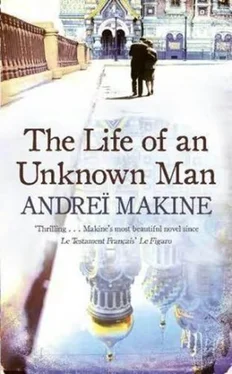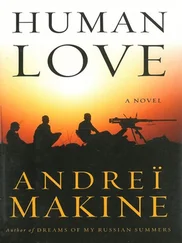Andreï Makine - The Life of an Unknown Man
Здесь есть возможность читать онлайн «Andreï Makine - The Life of an Unknown Man» весь текст электронной книги совершенно бесплатно (целиком полную версию без сокращений). В некоторых случаях можно слушать аудио, скачать через торрент в формате fb2 и присутствует краткое содержание. Жанр: Современная проза, на английском языке. Описание произведения, (предисловие) а так же отзывы посетителей доступны на портале библиотеки ЛибКат.
- Название:The Life of an Unknown Man
- Автор:
- Жанр:
- Год:неизвестен
- ISBN:нет данных
- Рейтинг книги:3 / 5. Голосов: 1
-
Избранное:Добавить в избранное
- Отзывы:
-
Ваша оценка:
- 60
- 1
- 2
- 3
- 4
- 5
The Life of an Unknown Man: краткое содержание, описание и аннотация
Предлагаем к чтению аннотацию, описание, краткое содержание или предисловие (зависит от того, что написал сам автор книги «The Life of an Unknown Man»). Если вы не нашли необходимую информацию о книге — напишите в комментариях, мы постараемся отыскать её.
The Life of an Unknown Man — читать онлайн бесплатно полную книгу (весь текст) целиком
Ниже представлен текст книги, разбитый по страницам. Система сохранения места последней прочитанной страницы, позволяет с удобством читать онлайн бесплатно книгу «The Life of an Unknown Man», без необходимости каждый раз заново искать на чём Вы остановились. Поставьте закладку, и сможете в любой момент перейти на страницу, на которой закончили чтение.
Интервал:
Закладка:
“Have we met before?”
The young woman slightly lifted the thick shawl that hid her forehead.
“Yes. I’m the one who doesn’t know how to eat pastries and you love hot chocolate.”
He stopped, thunderstruck, stared at her emaciated features, the huge, darkly ringed eyes… Mila!
One evening at the beginning of December Leningrad moved beyond words. Until recently these had been of some help in thinking about its icy death throes. One could say “war,” “blockade,” “famine,” and it all seemed logical. Until the day when, at the Five Corners intersection, Volsky and Mila saw an expanse of frozen water. Pipes had burst, leaving a vast mirror filled with purple sky and dark facades. They had been proceeding one step at a time, pausing every five minutes to catch their breath. Reaching the open space they stopped, dumbfounded. An unknown city was revealed in the reflection yawning at their feet. At the edge of this abyss sat a young woman, a statue covered in hoarfrost. Words contrived as best they could to reconstruct what had happened: a girl had tried to draw water there, had sat down, overcome with exhaustion. But words were shattered by this upside-down city, by the smile that could be made out on the girl’s frozen face.
… The previous day they had helped the old woman, Volsky’s neighbor, to leave the city. This tiny chance of getting away currently existed thanks to trucks that ventured across the frozen surface of Lake Ladoga. This route was not yet referred to by the people of Leningrad as “The Road of Life” but hundreds fled the city in this way, blessing the cold that solidified the waves, the cold that was deadly for those who remained… This escape route was the last scrap of meaning they could cling to in the dead city. The war, the siege, these trucks carrying children and old people to survival. Words and actions still linked in a semblance of logic…
The dusk at Five Corners turned that world upside down onto the purple surface of the ice-a vertiginous vision of apartment buildings, streetlamps, stars plunged deep into the earth. And at the edge of the frozen water, a girl seated there, smiling from the depths of her death.
They hardly spoke anymore. Words had lost their grip on what they were living through. They would have had to refer to these blocks of stone harboring corpses as “buildings.” And these vague, angular sketches of humanity as “townspeople.” “Food” meant boiled leather, and the paste from wallpaper diluted in water.
To protect these last sparks of life, thousands of women, thin as skeletons, worked flat-out at the conveyor belts of munitions factories, lining up rows of shells, thunderous streams of bullets. On the icy plains surrounding the city, men with faces furrowed by chilblains were hurling this steel against other men, who, with insane obstinacy, sought to conquer the immense graveyard that Leningrad was turning into. Every night the trucks set out across the ice of the lake, exposed targets that had to pit their wits against the bombers hounding them in the midst of the snow. Often the human cargo would vanish through the holes opened up by the bombs. On their return journey the trucks that got through brought bread, from which one-hundred-and-twenty-five-gram slices could be cut, giving a new lease, for a few more days, to this life words could no longer describe.
And above this ghostly world the mauve sun of the great frosts would rise, a dull disk, making only a brief appearance, inspiring thoughts of some unknown planet.
Everything that happened to them seemed as if it were taking place following their death. In an afterlife where, deep in labyrinths of stone, unique beings were dying, lost amid the confusion of emaciated bodies, amid the frenzy of the last shudders of hope, amid the fever of memories, while other human beings, a little more robust, were cutting out pieces of metal that men with faces scorched by the cold employed to kill those who had come to these snowy wastes to die.
This was how Volsky and Mila now saw the world, from a very remote perspective. A perspective that could have seemed godlike in its detachment, yet was grievously human, for each of them greatly dreaded the other’s death.
On that evening when they saw the city turned upside down, this dread had eyes that spied on them in the darkness. They had come home, had tried to light the fire, had failed. Their hands, made clumsy from weakness, could no longer manage to break up a piece of flooring. Someone was staring at them in the darkness with a scornful grimace, like a hunter contemplating his prey as it quakes at his feet…
Volsky turned away from this gaze, seized a bundle of sheets of paper, crumpled them one by one, filled the stove with them. All the books had already been burned, all that was left was these pages of sheet music and an opera libretto they had once been studying at the Conservatory. The fire was lit, they held out their hands to it, massaged their fingers, managed to dislodge a dozen or so blocks of wood.
As the sheets blazed, ripples of music and singing went up in smoke. Fear yielded to an unknown feeling: perhaps death was the birth of these echoes escaping from the burnt pages. This certainty of being somewhere other than in their starving bodies had nothing triumphant about it. Quite simply, without needing to say it, they knew that was how it was.
The next day this faith gave them the strength to go to the place where they had met on June 21… The Nord Café was shut, the street closed off with blocks of concrete, the entrances to the buildings transformed into machine gun posts. The city was preparing to undergo the final assault from the enemy. The inside of the café had changed little. The same counter with its bronze top, the same mirrors, and there, beneath a big mosaic on the wall, “their” table… Yes, a table in an empty room, bathed in coppery sunlight, deep calm. And in the window pane the reflection of two faces with their bones protruding from their skulls. So this was what death was.
They knew they were too far away from their building and that the crust of bread eaten that morning would not be enough for the return journey. The streets were lined with frozen bodies, some of them wrapped in makeshift shrouds, others sitting or lying there, frozen in the pose determined by their collapse. They walked slowly, experiencing no emotion at the sight of these dead people, nor at the idea, hazy and painless, of falling, becoming rigid. At one point Volsky noticed that Mila’s chin had turned white, it looked like a smear of powder, the warning sign of frostbite. He tried to rub this spot but he could barely command his numb fingers. Then he opened his coat for the young woman to lay her frozen face against his chest. They remained there, hugging one another in the middle of a street where, in the dusk, the dead kept watch. It was their first embrace.
Turning toward the Neva they saw a long queue outside a building. Famished as they were, they instinctively made the link: a crowd, ration tickets, a piece of bread. But this queue had an unusual look about it. People were going in at the door but no one was coming out, as if they had decided to eat their rations on the spot, away from the icy blast coming off the Baltic Sea. As they drew closer Volsky and Mila discovered to their amazement that this was a theater and people, rendered mute with exhaustion, were going to watch a performance. The poster for the Musical Comedy Theater announced an operetta: The Three Musketeers…
Without conferring, they moved toward the stage door. An old man, candle in hand, reminiscent of a lost character in a Chekhov play, greeted them, led them to the manager’s office. The latter was in the middle of breaking up wood and stoking an iron stove on which a saucepan was warming. He raised an emaciated face to them and his smile stretched the skin on his angular cheekbones. His eyes seemed fixed on a vision of horror. Volsky mentioned the Conservatory, asked if they could be useful…
Читать дальшеИнтервал:
Закладка:
Похожие книги на «The Life of an Unknown Man»
Представляем Вашему вниманию похожие книги на «The Life of an Unknown Man» списком для выбора. Мы отобрали схожую по названию и смыслу литературу в надежде предоставить читателям больше вариантов отыскать новые, интересные, ещё непрочитанные произведения.
Обсуждение, отзывы о книге «The Life of an Unknown Man» и просто собственные мнения читателей. Оставьте ваши комментарии, напишите, что Вы думаете о произведении, его смысле или главных героях. Укажите что конкретно понравилось, а что нет, и почему Вы так считаете.









